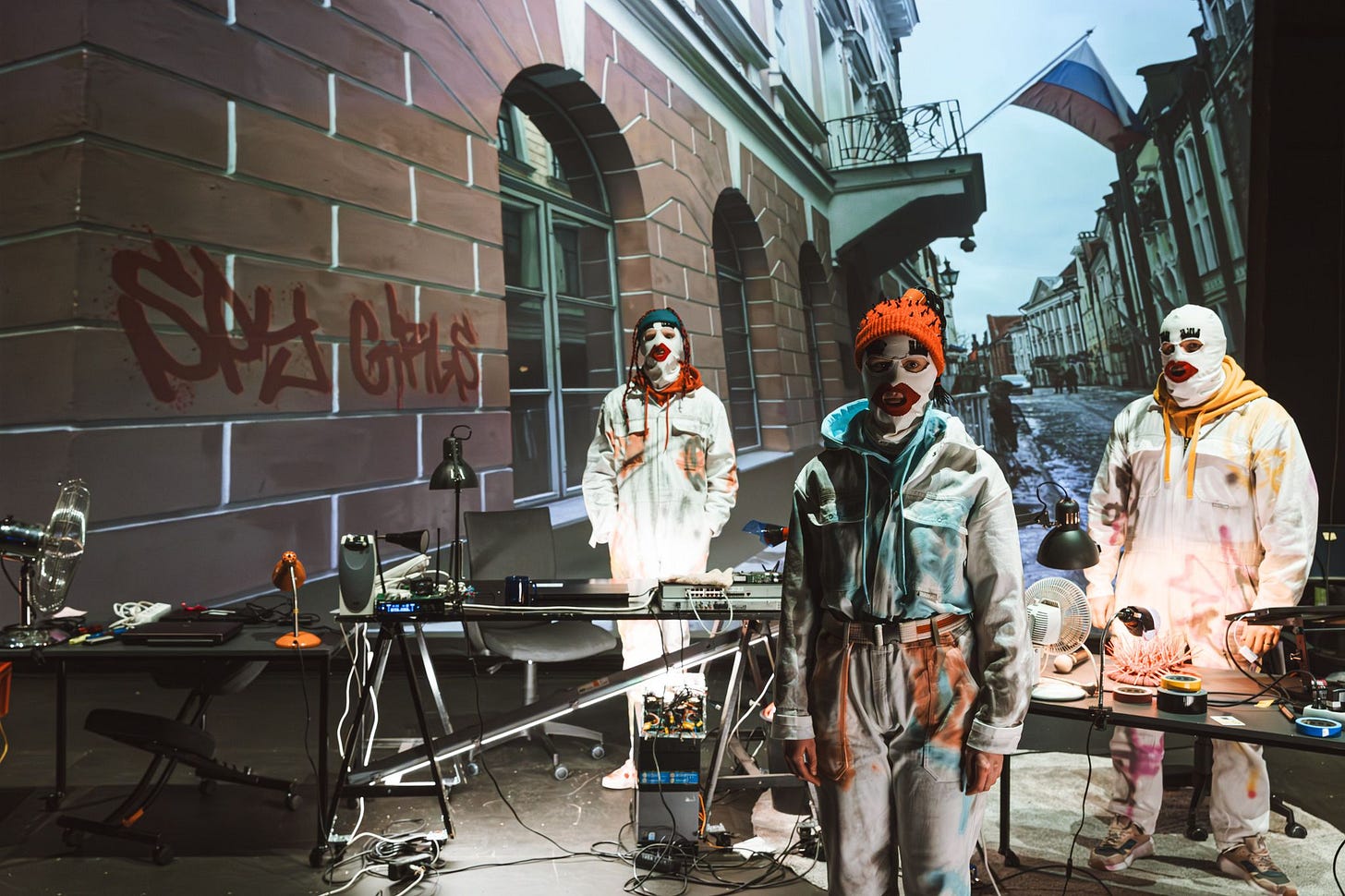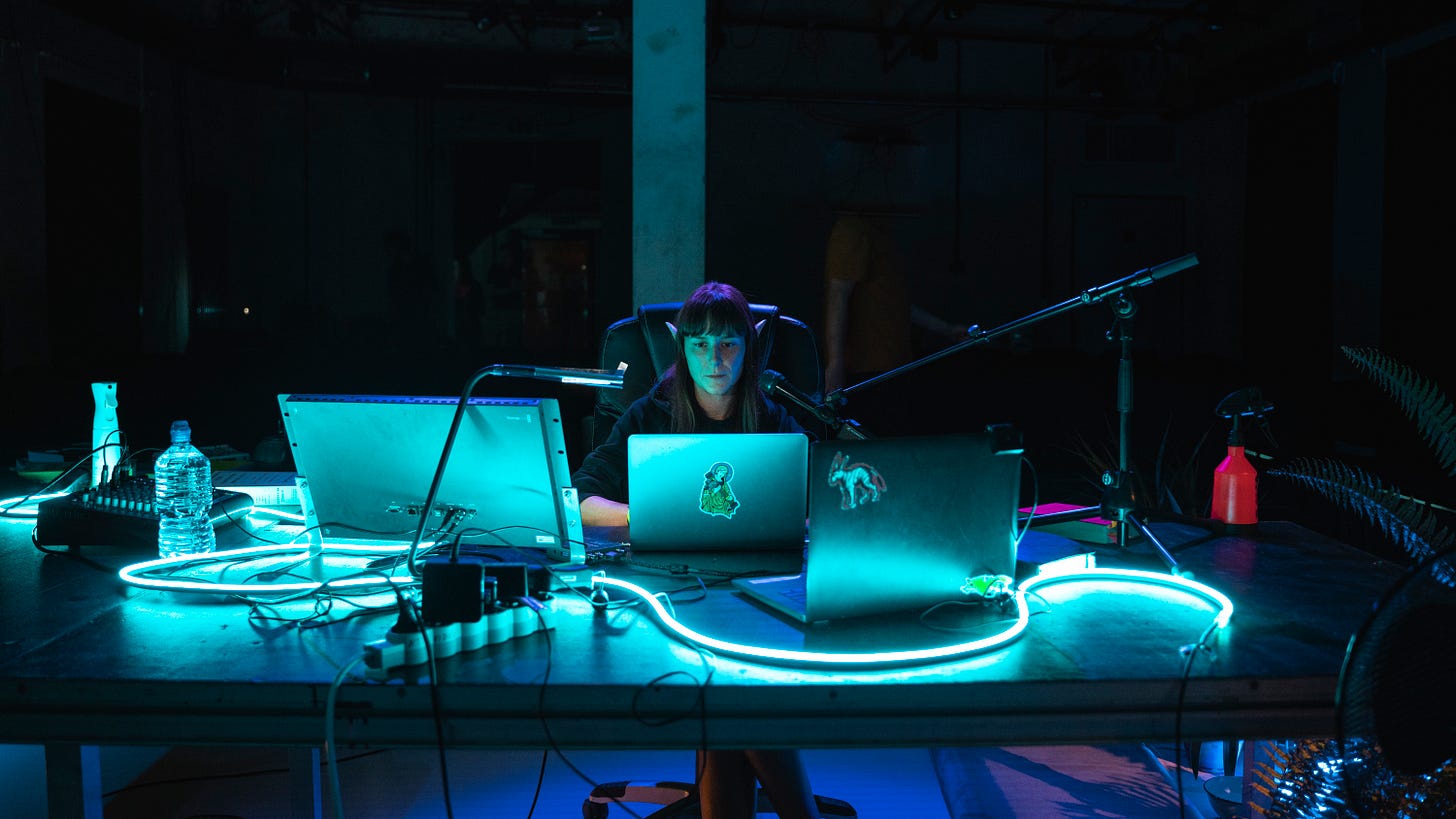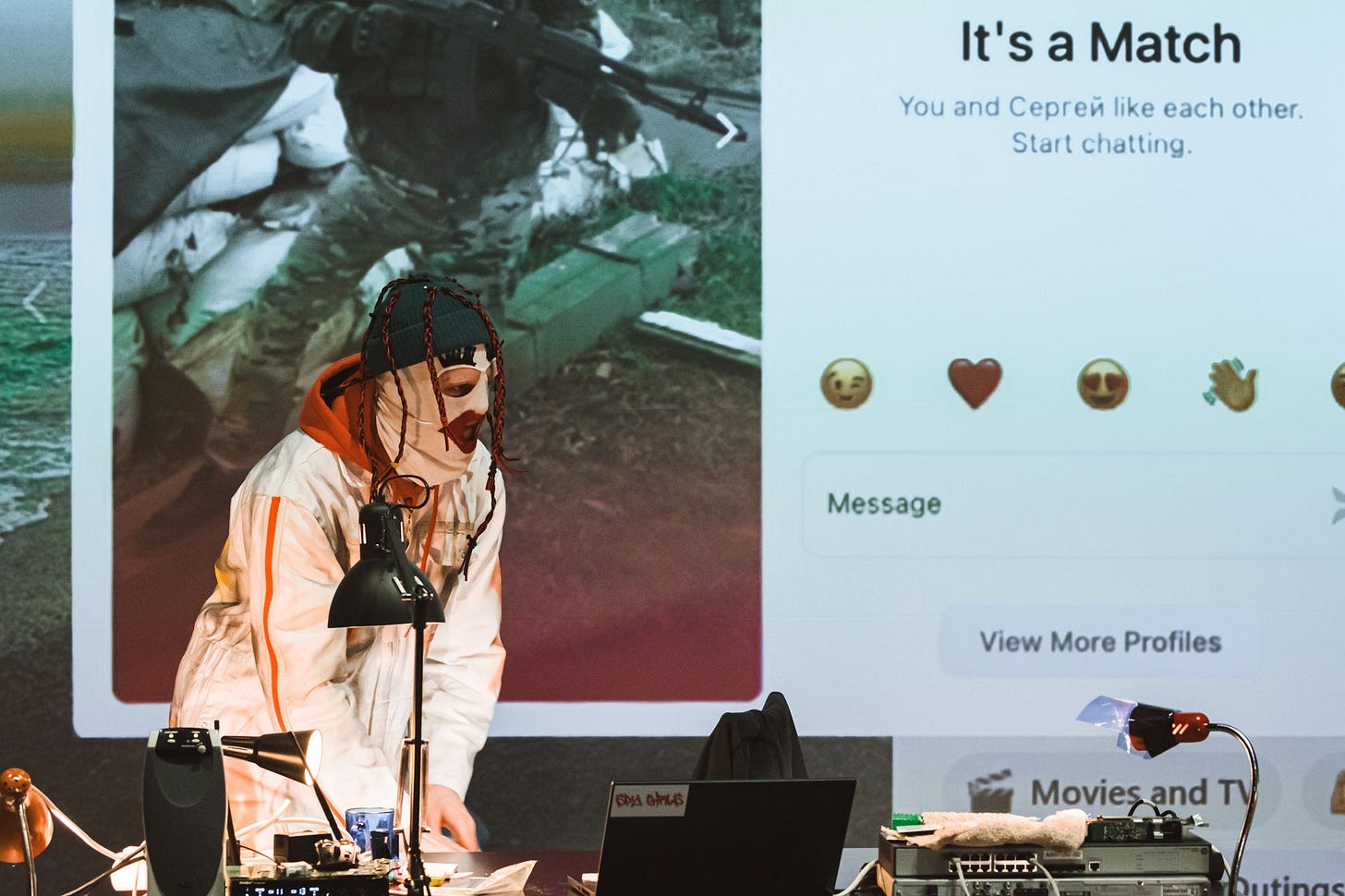Open source performance: Vaba Lava's Spy Girls and the world of the cyber elves
On a morally knotty show exploring the world of cyber activism and open source intelligence.
At the end of March I went to Norway, having been invited to host a discussion with the Kosovan playwright Jeton Neziraj as part of the Oslo International Theatre Festival, hosted by Black Box Theater. The resulting conversation about the necessity of being curious and open to work from cultures other than your own was the inspiration for my most recent column in The Stage. Also on the programme was a show by an Estonian company that fused cyber activism with live performance in a way I found at once exhilarating and ethically messy. I’m honestly still not completely sure how I feel about it, but this prompted me to want to talk to its creator about how she combines her work as a theatre director and as a ‘cyber elf.’
Here’s the nakedly transactional bit. This news letter is a pleasure to write, but it takes time. So if you want to support my writing while helping keep this Substack largely paywall-free (though there will be occasional paid subscriber bonus posts - like this one on Robert Icke’s Manhunt) - you can do so for just £5 a month or £50 a year. I also have a Ko-fi account, if you want to buy me a coffee. Or just share this newsletter with someone you think might find it interesting. That helps too.
Three masked figures in boiler suits peer at a laptop. They’re creating a social media profile. A pretty girl with a suntan, the kind of girl who might appeal to a lonely Russian soldier on the front line. They’re engaged in an elaborate act of catfishing, an attempt to extract data from these men.
Spy Girls, a production by the Estonian company Vaba Lava and the Polish director Magda Szpecht, pairs open source intelligence gathering techniques and cyber activism with live performance. The performers show us how, over a period of months, they communicated with soldiers and tried to glean information about their location and weaponry. It is a show that is not always easy viewing, raising a lot of not easily answerable questions about the ethics of what they are doing both as activists and artists.
The show draws on Szpecht’s own background as a cyber elf. Cyber elves are groups of anonymous cyber activists established in Estonia in 2014 to fight against pro-Kremlin trolls and Russian disinformation and cyber operations. Over time, the movement has spread to several European countries, and even to the US. The mostly anonymous elves don’t just combat disinformation and trolling campaigns, they also collaborate to create archives, including archives of war crimes against civilians which can then be used in legal proceedings. They verify videos by a process of geolocation and chrono-location, to find out where and when they were shot, using techniques pioneered by Bellingcat and networks like Forensic Architecture.
Szpecht, who studied journalism before she studied theatre directing, first got involved in the open-source Intelligence movement in 2021, at the start of the humanitarian crisis at the Polish-Belarusian border, during which migrants from the Middle East and Africa were being lured to Belarus to cross the border illegally. People ended up trapped at the border. At the time it was forbidden for journalists and medics to go there and to help directly there, she says, so she and her friends started to wonder what they could do from a distance. Szpecht discovered fake travel agencies in the Middle East which offered trips via Minsk to Europe. “They were taking a lot of money from people,” she explains. “And they were lying to them that you could fly to Minsk, go to the border, walk through the forest, and in 15 minutes you are in Germany.” They tried to close them down but every time they did, new ones opened.
When the full-scale invasion of Ukraine started in 2022, Poland “experienced a lot of chaos in the information space and a lot of disinformation that was targeted to stop Polish people from supporting Ukraine.” Szpecht realised that Poland required its own community of cyber elves to combat this. She created a character – basically her wearing a pair of plastic elf ears - and began posting the information that she uncovered and verified onto her Instagram account. She also created a lecture-performance Cyber Elf with Nowy Teater in Warsaw and Sirenos Festival in Vilnius, to explain the workings of this world and the methodologies of open-source investigation to interested audiences and alert them to the extent of Russian disinformation.
“I see many connections between cyber activism and theatre,” says Szpecht. Putting on a costume is a theatrical device but it’s also a kind of protection from the potential trauma that comes from watching videos of war crimes multiple times.
Szpecht also wanted to demonstrate that in times of war “everyone can do something and can find a way in which we can be useful.” Even if you are not in Ukraine, she says, “we can find ways in which to support Ukraine, and we have new technology that allows us to do this.” In one of Spzecht’s Cyber Elf videos she details the process involved in mapping the locations where civilians have been buried in Mariupol, often in public spaces like playgrounds, so that Russians can’t later destroy evidence of their war crimes. It’s painstaking and grim but vital work.
As a cyber elf, a lot of her work was focussed on exploring how disinformation is spread on social media. “Is it a bot? Is it a real person? Who's behind these accounts?” She became increasingly fascinated with the ways in which fake social media accounts were being used. Creating a credible online persona is, she says, in many ways similar to creating a role in a theatre. So, when she got the invitation to make a piece with the Estonian theatre company Vaba Lava, she was already thinking about these questions. How can theatre make itself useful in a time of war? What contribution could artists make?
At roughly the same time, a year after the start of the full-scale war, the dating app Tinder announced it would stop operating in Russia. A group of Russians even staged a mock beachfront funeral in Sochi to mark its passing. This gave Szpecht an idea. Initially she considered creating an entirely new dating app, but this proved to be logistically prohibitive. She learned that the Russian social media site VKontakte has its own dating feature called Znakomstva, which could be used to set up profiles designed to catch the eye of Russian soldiers.
The whole process of making the show took around eight months. A considerable amount of time was spent on planning the cyber security and exploring what kind of equipment and software they needed to use to stay safe. “I had to plan it very well, because I had to take care of the safety of the performers. There was no room for mistakes.”
“Estonia is a great hub when it comes to cyber security and modern technology,” says Szpecht. She contacted people in Estonian intelligence. “In exchange for the information that we got, they told us how to take care of our security and how to approach the soldiers in an effective way, so that they will open up.”
Casting the show presented its own set of challenges. It was necessary to find the right people to work in this project, people who were onboard with the aims of the project and who would be comfortable working in a legal and ethical grey zone.
Szpecht eventually found three people, one of whom is Ukrainian, who perform the show under the pseudonyms Mad Matrixx, Cyber Shadow and Void Vigilante wearing masks to conceal their identities.
For the next month, they spent eight hours a day gathering material. Instead of the traditional rehearsal process, they spent this time creating fake accounts and using them to talk to soldiers. They recorded everything that happened in the rehearsals, so they could present it on stage with the help of playwright Olga Drygas to shape the material.
Spy Girls documents the cast’s interactions with the soldiers via messages, photos and even video s(plus the inevitable dick pics). They show us how they use the material to figure out the soldiers’ movements and location. Sometimes they are flirtatious, sometimes maternal, interspersing talk about making borscht with questions designed to get the soldiers to reveal information they can use. In this way we gain a sense of what life is like for these young men, often fighting with outdated weaponry and inadequate supplies. The show’s creators even come across an online appeal circulated by the soldiers for equipment – including drones, but also for socks, underwear and cooking stoves. Later they spend some time examining a typical Russian military meal kit (and share it with the audience).
Open source intelligence gathering is an ethically complex area, as explored in this Bellingcat article. The show acknowledges that it inhabits a moral grey zone, that the information they extract from the soldiers might well lead to these men being killed. “Do we as artists even have a right to participate in a war in a neighbouring country in this way?” Szpecht asks.
Going into the project they wondered how they would feel “spending long hours talking to the enemy.” The men they were speaking to were often in the lowest ranks. They were not officers. Most will have been forced to serve. They knew they were essentially cannon fodder and they were forbidden from using apps in this way. Was there a possibility they might become friends with the soldiers? Would they end up wanting to save them?
This didn’t happen, says Szpecht. Most of the men they encountered were the products of an aggressively patriarchal system, which shapes their view of romantic relationships, and women in general. “Basically, they just want to purchase an item,” says Szpecht, “and have someone who will totally obey them, stay at home and give birth to another great Russian soldier.”
Even so they still had moments of doubt, says Szpecht. These are woven into the show. “There were a lot of emotions involved, from anger and fear, to also maybe at some point feeling sorry for those we are using.” Is there value in seeing this process explained and explored in a theatre setting, or does it cross a line?
Szpecht posits that the next step might be to remove people from the process, “to use an existing large language model to build bots that would automatically find soldiers in those dating apps and redirect the conversation to fake Telegram, which would gather the location data,”
One of the most striking moments in the show is when, live on stage, they call up one of the soldiers who then interacts with one of the performers, whose face is disguised by a deep fake. The idea says Szpecht is to see how long it takes them to register they are speaking with a deepfake. “Sometimes it succeeds, sometimes not. Some conversations last for up to five minutes, and then they ask us when we will be able to talk next time.”
Of all the moments in the show, this is the one with which the audience has the most trouble, says Szpecht. They’re not sure whether or not what they’re seeing is really happening live. Other audience members have said that the show humanises the Russian soldiers, enabling them to see them, often for the first time, “not only as beasts from Bucha committing war crimes, but as normal guys.” Others question the legality of what they are doing, but so far, she says most people who watch the show seem to feel that the war justifies these tactics.
The role of the cyber elf, as mentioned, is also to expose and combat Russian disinformation. I ask her why are people susceptible to this and what steps could they take to protect themselves? “It's important to remember that we are so easy to manipulate because we need to trust each other so that society can function.” That’s fundamentally a good thing, she says. It’s impossible to live your life being suspicious of everything and everyone. However, in times of hybrid warfare, information can be used as a weapon so it’s important to educate ourselves about what sources are reliable. In times like this we need rigorous, reliable journalism more than ever.
It’s also important to acknowledge that everyone is susceptible to misinformation. It’s important to be able to admit and address your mistakes if you end up sharing something that turns out to be false.
“Social media is a very good tool to polarize society. It is easy to polarize people, to make them argue while using social media, and this is very useful because it makes people spend more time there,” she says, which is why exercising digital hygiene is also essential. “When we use too much social media and watch too much news, we become numb.” While more often than not we recognise AI generated images when we see them, “the bigger problem is that people do not believe real images anymore, or they don't feel empathy towards them.” One of the questions artists, particularly those working in documentary forms need to ask themselves is “how can we raise empathy in times where everyone is so fed up with images of war and war stories?” It’s different when we are able to watch these things happening live in real time. “Maybe this is the future,” she says.
Szpecht clearly feels that artists, that all of us, have a responsibility to do what we can, to take action. The cyber elf movement is one of volunteers and she finds this inspiring. “I would be happy to see a similar culture of volunteering in Poland, because it turns out that people can be very helpful.” However, it’s demanding work, in terms of hours and the psychological toll of engaging with this often distressing material. After a short period of time, people tend to lose interest. “They burn out. It's difficult to keep going.”
Theatre can sometimes feel obsolete as an artform, she says. In Poland, it's quite difficult to find a public institution to produce this kind of work. “I have a feeling that nowadays, mostly people want to see a comedy or a musical. It's really difficult to produce political art.”
However, theatre can have a role to play. Open source intelligence is a multi-disciplinary field. Theatre can connect people with real events. “It has the ability to react to the crisis when the crisis is happening, not two or three years later or three years later.” This is essential if theatre isn’t to end up as just the pursuit of the privileged few. “The goal here is to make something that is more than just a piece of theatre but to use it as a tool of activism.”
This week in European theatre
A round-up of festivals, premieres and other upcoming events over the next seven days
Theatertreffen - Bringing together the ten best performance from the past year of the German-language theatre scene – whittled down from 738 – highlights of this year’s Theatertreffen programme include Florentina Holzinger’s controversial roller skating nun opera Sancta, ja nichts ist ok, the final work by director René Pollesch, the late artistic director of the Volksbühne, and Blutbuch, Jan Friedrich’s adaption of the cult novel by Kim de l’Horizon for Zurich Schauspielhaus. The festival takes place in venues across Berlin from 2-18 May.
Leviathan - The third part in a cycle conceived by Lorraine de Sagazan and Guillaume Poix, Leviathan explores questions raised during a series of three hundred interviews they conducted about crime, punishment, justice and the penal system. It opens at the Odéon-Théâtre de l'Europe in Paris on 2 May.
POLIS Teatro Festival - Now in its 8th edition, this small festival in the beautiful Italian city of Ravenna has a different regional focus each year. This year it’s an Iberian focus with a programme of work from Portugal and Spain including the documentary theatre company Hotel Europa. The festival runs from 2-11 May.
Futur4 – Created by Helgard Haug and Daniel Wetzel, this new piece of documentary theatre from Rimini Protokoll - the third in a series of monologues - explores generational expectations of the future and is told from the perspective of as a young girl taken from Romania by the Federal Republic of Germany as a child in the early 1970s. The show plays Staatsteater Wiesbaden from 3-5 May, with further European tour dates taking place across the summer.
50 Minutes - Subtitled The War War, Jaw Jaw, Bunny Play, British novelist Deborah Levy’s play about a rabbit on the analyst’s couch was a hit at Theater Neumarkt in Zurich earlier this year and returns for a second run from 4-7 May. You can read more about the play in Arifa Akbar’s recent interview with Levy in the Guardian.
Thanks for reading! If you have any feedback, tips, or thoughts about this newsletter, you can reach me on natasha.tripney@gmail.com





